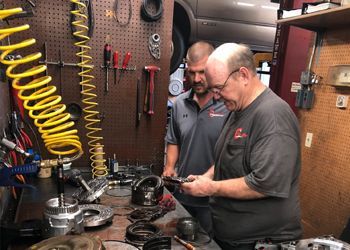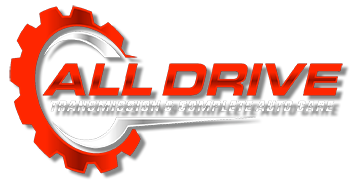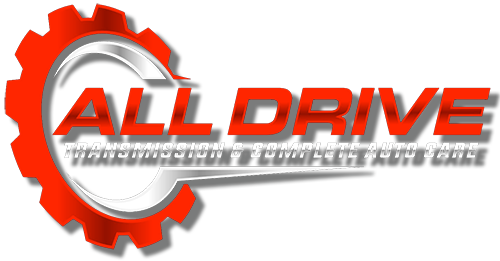All Drive Transmission Blog

Your vehicle’s automatic transmission is tasked with smoothly transferring power from the engine to the wheels. Because it works so hard every time you drive, proper care is essential to avoid costly repairs and promote a long lifespan. By following good maintenance habits and paying attention to your car’s performance, you can help your transmission stay in excellent condition for years to come. Here are four ways to help keep your automatic transmission in great shape for the long-term future. Stay Consistent with Fluid Changes Transmission fluid is critical for cooling, lubrication, and smooth shifting. Over time, it can break down and become contaminated with debris, which increases wear and strain on the transmission. To protect this vital system, check your owner’s manual for the recommended service interval and have the fluid replaced as needed. Using the correct type of fluid is equally important. Clean, fresh fluid keeps the transmission operating smoothly and prevents premature damage. Be Careful Not to Overload Your Vehicle Carrying excessive weight or towing beyond your vehicle’s rated capacity can put enormous stress on the transmission. Heavy loads force the system to work harder, increasing heat and accelerating wear. If you need to tow, use the proper equipment and stay within your manufacturer’s limits. By keeping loads manageable and avoiding unnecessary strain, you’ll help extend the life of your transmission. Don’t Shift Between Drive and Reverse While Moving Switching between drive and reverse without coming to a complete stop can cause sudden internal stress on the transmission components. These abrupt gear changes can lead to worn and damaged gears. Always make sure the vehicle is fully stopped before shifting, which allows the transmission to engage properly and operate without unnecessary strain. Don’t Ignore Early Warning Signs An automatic transmission that’s beginning to fail will often show warning signs such as delayed shifting, slipping gears, strange noises, or fluid leaks. Ignoring these symptoms can lead to worsening damage and expensive repairs. If you notice any unusual behavior, have your transmission inspected promptly by an experienced transmission mechanic. Early diagnosis can often prevent a small issue from becoming a major problem. Transmission Service in Des Moines, IA When you need transmission service in Des Moines and the surrounding area, contact All Drive Transmission at 515-384-0629 . Feel free to give us a call to schedule an appointment!

Your car’s transmission is one of its most vital systems, responsible for transferring power from the engine to the wheels. To keep it running smoothly, it relies on transmission fluid for lubrication, cooling, and proper operation. When a leak develops, it may seem minor at first, but ignoring it can lead to severe damage. At All Drive Transmission, we provide expert transmission fluid leak repair in the greater Des Moines area. Recognizing the signs of a transmission fluid leak early can help you address the issue before it escalates. Spots Under Your Car One of the most obvious signs of a transmission fluid leak is a puddle or spot beneath your parked vehicle. Transmission fluid is usually reddish in color, although it can appear brown if it’s old or contaminated. If you notice this type of fluid on your driveway or garage floor, it’s a warning sign that your transmission is leaking and needs immediate attention. Difficulty Shifting Gears Healthy transmission fluid ensures smooth gear changes. When fluid levels drop because of a leak, you may begin to notice hesitation or difficulty when shifting. Left unchecked, this can cause further wear and tear on the transmission’s internal components. Unusual Noises from the Transmission Another warning sign is strange noises when the transmission is engaged. You may hear whining, clunking, or grinding sounds when shifting gears or while the vehicle is in motion. These noises often indicate that the transmission fluid isn’t circulating properly due to low levels from a leak, leaving parts unprotected and vulnerable to damage. Overheating Transmission Transmission fluid plays an important role in regulating temperature. If you’re driving and notice burning smells, a fluid leak may be to blame. Without adequate lubrication and cooling, the transmission can quickly overheat, leading to warped components and potentially complete transmission failure. Slipping Gears While Driving A transmission fluid leak can also cause gears to slip unexpectedly while driving. You may press the accelerator only to feel the engine rev without a corresponding increase in speed, or the vehicle may suddenly shift out of gear. This is not only a performance issue, but also a major safety hazard that requires immediate repair. Transmission Fluid Leak Repair in Des Moines, IA For expert transmission repair in Des Moines and the surrounding area, contact All Drive Transmission at 515-384-0629 . Feel free to give us a call to schedule an appointment!

A healthy automatic transmission helps ensure smooth gear shifts and efficient performance. When transmission problems arise, they can escalate quickly and lead to major repairs or complete failure if not promptly addressed. Many early warning signs of transmission trouble can seem minor, but ignoring them may result in costly damage. If you notice any unusual behavior from your vehicle, it’s best to have a trusted mechanic inspect it right away. At All Drive Transmission, we provide expert automatic transmission repair in the greater Des Moines, IA area. Here are four common automatic transmission issues that should be professionally handled without delay. Slipping Gears One of the most alarming signs of a transmission problem is when your vehicle unexpectedly slips out of gear. This can happen when the transmission momentarily disengages and then re-engages while you're driving, which can be dangerous on the road. Gear slipping often points to worn-out transmission bands, low fluid levels, or internal mechanical failure. This issue affects the car’s ability to maintain consistent power and control, so it should be checked immediately. Delayed or Rough Shifting If you notice a delay when shifting from park to drive or experience rough transitions between gears, your transmission is likely in significant trouble. These symptoms might result from low or dirty transmission fluid, worn components, or electronic control issues. Delayed engagement and harsh shifting put unnecessary stress on the transmission and can worsen over time. A mechanic can run diagnostic tests to determine the cause and perform needed repairs before the issue becomes more severe. Unusual Noises Grinding, whining, or clunking noises when your vehicle shifts gears are signs that the transmission isn’t functioning properly. These sounds can indicate internal wear, damaged gears, or fluid-related problems. Because automatic transmissions rely on a precise balance of components and hydraulic pressure, any abnormal noise is cause for concern. Leaking Transmission Fluid Transmission fluid is vital for cooling, lubricating, and powering your vehicle’s transmission. If you spot reddish fluid under your car, it could be leaking from the transmission pan, seals, or elsewhere. A loss of fluid leads to overheating and poor performance. Even a small leak should be addressed quickly to avoid running the transmission dry, which could result in complete failure. Automatic Transmission Repair in Des Moines, IA When you need transmission repair in Des Moines and the surrounding area, contact All Drive Transmission at 515-384-0629 . Feel free to give us a call to make an appointment!

Transmission fluid plays a crucial role in keeping your vehicle’s transmission system running smoothly. It lubricates moving parts, cools the system, and helps ensure proper gear shifting. When you notice reddish fluid under your vehicle, it's often a sign of a transmission fluid leak—a problem that should never be ignored. At All Drive Transmission, we provide expert transmission fluid leak repair in the greater Des Moines, IA area. Here are four reasons why it’s important to fix a transmission fluid leak as soon as possible. Prevent Major Transmission Damage Transmission components require proper lubrication to function correctly. When fluid levels drop due to a leak, the transmission can overheat and parts can begin to wear out quickly. Continued driving with low fluid can lead to major internal damage. Fixing a small leak right away is far less costly than rebuilding the transmission. Protect Your Vehicle’s Performance Low transmission fluid can cause your car to perform poorly. You might notice delayed or rough gear shifts, slipping gears, or strange noises when accelerating. These symptoms not only affect your driving experience. but can also compromise your ability to drive safely. A well-sealed transmission helps maintain smooth performance, making your vehicle more reliable on the road. Prevent Environmental Harm Leaking transmission fluid isn’t just bad for your car—it’s also hazardous for the environment. Fluid that leaks onto driveways, roads, and parking lots can eventually wash into storm drains and contaminate local waterways. Promptly repairing leaks helps minimize your vehicle’s environmental impact while also helping to keep your driveway free of ugly stains. Maintain the Value of Your Vehicle A vehicle with a leaking transmission can lose significant resale value. Prospective buyers and dealerships are likely to be wary of leaks, which often indicate poor maintenance or hidden damage. Keeping your transmission in good condition—including quickly addressing any fluid leaks—helps preserve your car’s market value. Transmission Fluid Leak Repair in Des Moines, IA When you need transmission repair in Des Moines and the surrounding area, contact All Drive Transmission at 515-384-0629 . Feel free to give us a call to schedule an appointment for transmission service in Des Moines!

Your vehicle’s transmission is responsible for transferring engine power to the wheels, allowing your car to move efficiently. When the transmission begins to fail, your vehicle’s performance can decline rapidly, and further damage can become costly. Catching issues early is essential. At All Drive Transmission , we provide expert transmission repair in the greater Des Moines, IA area. Here are four common transmission problems that should be addressed immediately by a qualified mechanic. Delayed or Slipping Gears If your vehicle hesitates when shifting or if it unexpectedly slips out of gear while driving, this is a major red flag. Gear slipping can make it feel like your car is struggling to stay in the correct gear. Not only does this compromise performance, but it also poses a safety hazard, especially at higher speeds. This issue often points to a problem with transmission fluid. Unusual Noises Hearing grinding, whining, or clunking sounds when your car shifts gears is a strong indication of internal transmission trouble. These noises can be caused by damaged gears or low fluid levels. Any new sound coming from your transmission should never be ignored, as it commonly means that metal parts are not moving smoothly and may be wearing down due to friction. Early detection can often prevent more extensive repairs. Burning Smell A noticeable burning odor coming from your car can be a sign that your transmission is overheating. Transmission fluid keeps the system cool and lubricated, but when the fluid becomes old or contaminated, it can’t do its job properly. Overheating can cause major internal damage, and if you continue driving without addressing it, you may end up needing a complete transmission rebuild or replacement. Transmission Fluid Leaks If you see reddish fluid pooling under your vehicle, it could be a transmission fluid leak. Any loss of fluid can quickly lead to performance problems and internal damage. Leaks may occur at seals, gaskets, or from a cracked pan. A mechanic should inspect and fix the source of the leak right away and refill the fluid to the proper level. Transmission Repair in Des Moines, IA When you need transmission repair in Des Moines and the surrounding area, contact All Drive Transmission at 515-384-0629 . Or local transmission mechanics can expertly handle your vehicle’s transmission needs . Feel free to give us a call to make an appointment !


